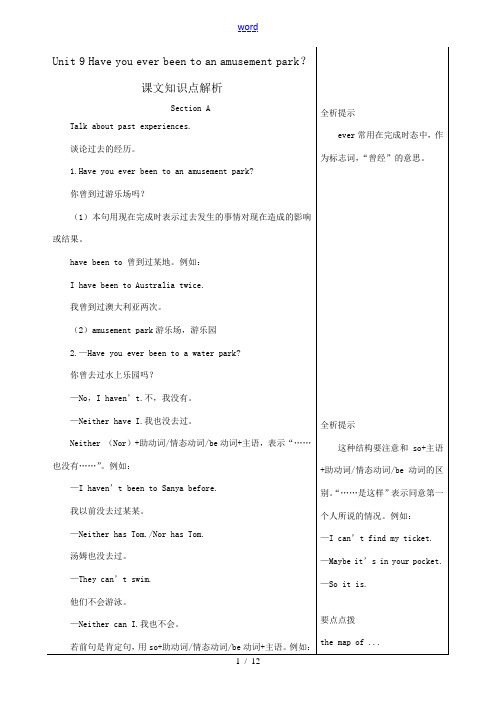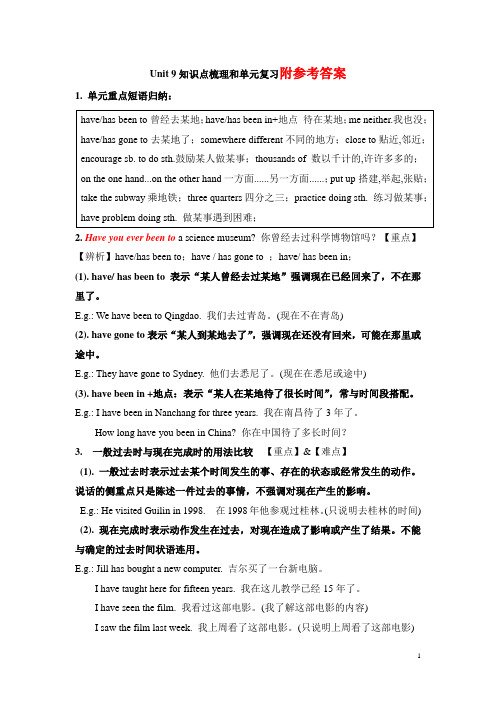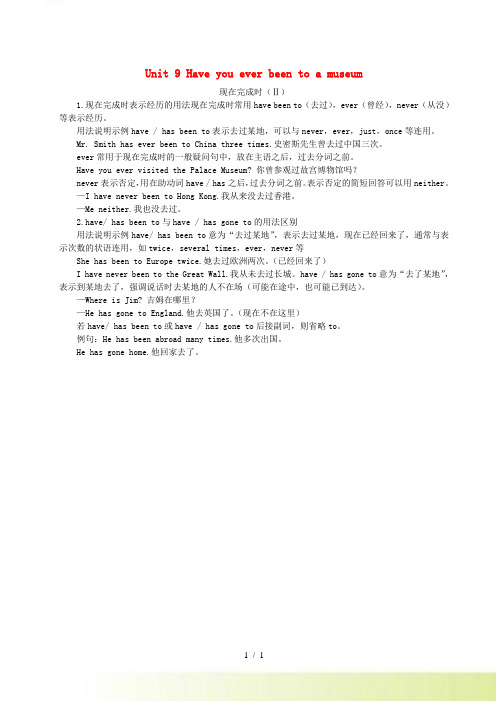2020年春人教版英语八年级下册unit 9 have you ever been to a museum part 2 section a(课后)
- 格式:ppt
- 大小:1.68 MB
- 文档页数:31


人教版英语八年级下册Unit 9 Have you ever been to a museum?教学目标知识与能力掌握现在完成时态句型Have you ever…? 的答语形式;学会谈论过去发生的事。
过程与方法通过情景导入来引导学生谈论过去发生的事,提出Have you ever…? 问题,继而引出一些新的词汇和句型,然后通过精讲多练的课堂教学来达到本节课的教学目标。
情感态度价值观谈论过去发生的事应是学生很感兴趣的课堂活动,大多数学生喜爱回忆过去并会讲故事。
教学重、难点及突破重点重要句型Have you ever been to Europe? Yes, I have./No, I haven never been to Europe.重点词汇theme park, boats, zoo, European, Holland, houses, travel, space, cartoons, culture, neither,old-fashioned, Peru, rent, South America, visitors, wonderful难点现在完成时态句型Have you ever…? 的答语形式。
教学突破通过情景导入提出Have you ever…? 问题,引导学生积极参与课堂口语交际,学习使用新的词汇和短语,来训练和强化现在完成时态句型Have you ever…? 的答语形式。
教学准备教师准备制作课本2a部分的插图,使用大白纸制作,或制作幻灯片。
也可以直接使用教学挂图。
学生准备预习课本内容,初识新词汇。
教学步骤(第1课时)第一课时教学流程设计教师指导1.情景导入谈论过去发生的事。
2.引导学生进行听力训练。
3.Pairwork小组活动。
学生活动1.谈论过去发生的事。
2.进行听力训练活动。
3.Pairwork小组活动:对话交流和问卷调查。
一、第一教学环节情景导入谈论过去发生的事(约分钟)二、第二教学环节听力训练活动(约分钟)三、第三教学环节Pairwork小组活动(约分钟)四、本课小结引导学生学习Have you ever…? 的答语形式和现在完成时态的用法。

Unit 9 Have you ever been to a museumSection B&Self CheckⅠ.单项选择1.In our city, C middle school students want to work as a teacher in the future.A.thousandB.thousand ofC.thousands ofD.two thousand of2.On C hand,she is a daughter.On hand,she is a mother.A.one;otherB.the one;anotherC.the one;the otherD.one;other3.—What time should I come here tomorrow?—Come C you like.A.whereverB.howeverC.wheneverD.whatever4.This place is not C.We must leave here as soon as possible.A.dangerousB.specialC.safeD.famous5.—What do you think of the environment here?—Wonderful! A of the land covered with trees and grass.A.Two fifths;isB.Two fifth;isC.Two fifths;areD.Two fifth;areⅡ.任务型阅读Dear Zhang Hua,Have you ever been to Thailand?It is a country in Southeast Asia.I’ve been in Thailand for a few days with my parents.We are here for a holiday.Now we are staying in Bangkok(曼谷).It is the capital of Thailand and it is a very interesting place to visit.Yesterday we visited some places of interest in thecity.They are great!This morning we went shopping.Bangkok is a wonderful place to shop for jewelry(珠宝)and clothes.My mother bought a nice necklace(项链).My father and I bought some fashionable T-shirts.Thailand is called “Land of Smiles”,because people here are very friendly.Andit’s true!When we eat in the restaurants in Bangkok,the waiters are really nice and they are always smiling.Thai food is delicious,but it is sometimes a little hot(辛辣的)for me.You can also get Chinese food here because a lot of Chinese people came to live in Bangkok many years ago.Chinese food is very good, and it isn’t as hot as Thai food.Our American food can also be found in Bangkok.However,I don’t eat it.You know,I’d like to try new things when I travel.The weather is always very hot.Yesterday it rained and got a little cooler.But today it’s hot again.Yours,Mary 根据短文内容,回答下列问题。



Unit 9 Have you ever been to a museum?第一节单项选择。
(本题共15小题,每小题1分,计15分)( )1. people have lost their lives in this earthquake.A. ThousandsB. Thousand ofC. Thousands ofD. Ten thousands( )2. —Have you ever met a group of on the bus? —Yes, I have.A. GermenB. GermansC. GermanD. Germens( )3. I a tour guide for 7 months.A. becameB. wasC. have beenD. have become ( )4. The man fears in the river because he can’t swim.A. playB. playsC. to playD. playing( )5. you like swimming, fishing boating, you’ll have fun in the water park.A. Whether; orB. If; orC. Either; orD. Both; and ( )6. I ________ never ________ there before.A. have, been toB. have, beenC. have, gone toD. have, gone( )7. I have newer been _______.A. campingB. campC. campedD. camps( )8.—Where is Bill? —He ________ Sydney with his father.A. has gone toB. has been toC. have gone toD. have been to( )9. The village is ________ the mountains.A. amongB. betweenC. in the middleD. along( )10. There are five ________ people in the city.A. millionB. million ofC. millions ofD. millions( )11. —I have never been to Tibet. What about you, Tina? —Me.A. tooB. alsoC. eitherD. neither( )12. Don’t talk loudly, or you will the baby.A. wake upB. get upC. put upD. give up( )13. you come, you can see beautiful flowers in our school yard.A. WhateverB. WhereverC. WheneverD. Whoever ( )14. Laura bought this house because it is close to the school.A. especiallyB. finallyC. simplyD. recently( )15. —Hello! Could I speak to Lily?—Sorry, she is not in. She Shanghai.A. have been toB. have gone toC. has been toD. has gone to第二节完形填空。

Unit 9 Have You Ever Been to an Amusement Park?一、学习目标:1.掌握现在完成时的用法;2.了解一般过去时、现在完成时和现在完成进行时的意义的区别;3.能够准确使用多种时态谈论自己的经历。
二、学习重点难点:1. 现在完成时由主语+have/has+过去分词构成。
其主要用法如下:I.在未指明具体时间的情况下,现在完成时动词通常可以表示在说话之前已经完成,而后果或影响至今仍存在的动作。
例如:The concert has started. 音乐会已经开始。
I have had breakfast. 我已吃过早饭。
注意:have gone to 和have been to 在意义上有区别。
例如:He has gone to Hong Kong. 他到某某去了。
(他已前往某某,或在途中,或已到达。
说话人暗示他现在不在现场。
)He has been to Hong Kong. 他曾到过某某。
(说话人认为他过去到过某某,现在已不在该地。
言外之意他对某某有所了解。
)II. 现在完成时动词可以表示开始于过去持续到现在(也许还会继续进行下去)的动作或状态。
例如:1) I have studied English since last year. 我从去年开始学习英语。
2) She has lived in Beijing for five years. 她住在已经五年了。
注意:e, go , leave, arrive, buy, lose, receive, join, die, bury 和marry 等动词所表示的动作是一时的,不能延续的,故不能与for …,since …等开头的表示一段时间的状语连用。
不过,这些词用于否定句则可以与表示持续的时间状语连用,即动作的不发生是可以持续的。
例如:不能说:*He has e to Beijing for two years.*He has bought that book for three weeks.*He has joined the Army for one and a half years.*His grandma has died for nine months.* I have received his letter for a month.可以说:He has been in Beijing for two years.He has had that book for three weeks.He has been in the army for one and a half years.His grandma has been dead for nine months.I haven't received his letter for almost a month.或者:It is two years since he came to Beijing.It is three weeks since he bought that book.It is one and a half years since he joined the Army.It is nine months since his grandma died.2. 现在完成时把过去的动作和现在的结果联系起来,一般过去时只限于表示过去的动作本身,与现在的结果无关。

.课题:Go For It! 八年级下Unit 9. Have you ever been to an amusement park? (第一课时:听说课)教学目的:1.通过听力训练及对话练习、调查活动等引出第九单元关于现在完成时态的用法。
2.重点操练句型:Have you ever been to…?3.利用多媒体教学,使学生开拓视野,增强学习英语的兴趣。
学生分析:学生已经学过一般过去时态的用法,在Unit6初步接触过现在完成时,但没有接触多媒体课堂环境。
教学步骤:Ⅰ.Watch MTV & Disneyland.Ⅱ.Greetings & Revision.Ⅲ.Presentation:A.Ss learn the new words according to the pictures.B.Show a photo, present the patterns:T: I have ever been to Zimalin Park,but I haven’t been to Beijing.Have you ever been to Zimalin Park?S1: Yes, I have. / No, I haven’t. How about you?T: Me, too. / Me, neither.Ⅳ.Activities:Task 1: Pairwork: Ss talk about if they have ever been tosomewhere, using the pictures. Four pairs act outthe conversations.Task 2:1a-1b.Task 3: Make a survey and have reports.Task 4: Guessing game.Ⅴ.Summary & Homework.。

Unit 9 Have you ever been to a museum?Section A(1a-2d)知识点一have/has been to去过某地Have you ever been to a science museum?你曾经去过自然博物馆吗?have/has been to意为“曾经去过某地”,但现在已不在那里了。
I have never been to Kunming before.我以前从没去过昆明。
My father has been to Hong Kong many times.我爸爸去过香港很多次。
1.have/has gone to意为“去了某地”,说话时该人不在现场,主语为第三人称。
—May I speak to Mr.Smith?——我可以和史密斯先生通电话吗?—Sorry,he has gone to China.——抱歉,他去英国了。
2.have been in意为“在某地”,表示在某地待了多少时间,常与表示一段时间的状语连用。
They have been in New York for five weeks.他们在纽约五周了。
知识点二反意疑问句It’s really interesting,isn’t it?它真的很有趣,不是吗?这是一个反意疑问句。
反意疑问句是由“陈述句 +附加疑问句”构成,遵循“前肯后否,前否后肯”原则。
此问句可用yes或no来回答。
附加反意疑问部分的主语要用代词,并与陈述部分主语一致,谓语动词在人称、数和时态上也要与陈述部分一致。
Linda won the speaking competition,didn’t she?琳达赢了演讲比赛,是吗?【温馨提示】1.含有never,hardly,seldom等的句子为否定句,反问部分用肯定形式。
2.反义疑问句的回答要“据实回答”,即事实是肯定的,就做肯定回答;事实是否定的,就做否定回答。
—Mary comes from England,doesn’t she?——玛丽来自英国,是吗?—No,she doesn’t.She is from the UAS.——不,不是。


Unit 9知识点梳理和单元复习附参考答案1. 单元重点短语归纳:have/has been to曾经去某地;have/has been in+地点待在某地;me neither.我也没;have/has gone to去某地了;somewhere different不同的地方;close to贴近,邻近;encourage sb. to do sth.鼓励某人做某事;thousands of 数以千计的,许许多多的;on the one hand...on the other hand一方面......另一方面......;put up搭建,举起,张贴;take the subway乘地铁;three quarters四分之三;practice doing sth. 练习做某事;have problem doing sth. 做某事遇到困难;2. Have you ever been to a science museum? 你曾经去过科学博物馆吗?【重点】【辨析】have/has been to;have / has gone to ;have/ has been in;(1). have/ has been to 表示“某人曾经去过某地”强调现在已经回来了,不在那里了。
E.g.: We have been to Qingdao. 我们去过青岛。
(现在不在青岛)(2). have gone to表示“某人到某地去了”,强调现在还没有回来,可能在那里或途中。
E.g.: They have gone to Sydney. 他们去悉尼了。
(现在在悉尼或途中)(3). have been in +地点:表示“某人在某地待了很长时间”,常与时间段搭配。
E.g.: I have been in Nanchang for three years. 我在南昌待了3年了。
How long have you been in China? 你在中国待了多长时间?3. 一般过去时与现在完成时的用法比较【重点】&【难点】(1). 一般过去时表示过去某个时间发生的事、存在的状态或经常发生的动作。

Unit9 Have you ever been to a museum?Section A(3a-3c)教案Teaching aimsKnowledge aims:Ss can master new words and language chunksAbility aims:1.Ss can understand the passage.2.Ss practice reading and writing.Moral aims:Educate students to care about things around them.Teaching key points1.Be able to understand the passage.2.Learn to talk about things about them and learn to use “have/has been to…”Teaching difficulties:1.Learn to talk about things in their lives2.Learn to use “have/ has been to …”Teaching stepsStep 1, Warming upShow Ss a picture about a museum ,ask Ss to guess what kind of mesuem i t is.Step 2, Before reading1.Show Ss a picture of new words to consolidate the new word s.2.Show Ss three p ictures about 3a. Ask Ss to talk about every picture.Eg:T: What can you see in the first picture ?S1: I can see three computers.T: What do you think we will read in the passage ?S2: About a computer museum.T: Great ! What can we learn in a computer museum ?S3: The story of comput ers.S4: The usage of computers.S5: ….Step 3, While reading1.First reading1)Give Ss 1 or 2 minutes to ask them to read the passage quickly and answer the question.Which three museum do you think about ?2.Careful reading1)Read Para. 1 to answer the 2 questionsWhat do they have in the American Computer Museum?What’s the differences between the old computers and the new ones ?2)Read Para 2 to answer the 2 questionsWhat did Amy see in the International Museum of Toilets in India ?What does the International Museum of Toilets encourage people to do ?3)Read Para.3 to answer the following questionsWhat do the tea art performances show?Why does LinLin’s grandpa love collecting tea sets ?4)Read the article again and answer the following questions (3b).What does Ken say about the American Computer Museum?What can we learn at the International Museum of Toilets?Why is the Hangzhou National Tea Museum a nice place to enjoy tea ?5)Read the passage and find out the difficult points. Disc uss them in groups.7) Share the whole story with students according to the chart.8) Retell the story according to the charts.Step4, After readingAsk Ss to finish 3c by themselves , then check the answers. Step5, HomeworkSearch other museums and try to write a report.。


2020年春人教新目标英语八年级下册Unit 9 Have you ever been to an amusement?短语归纳1.amusement park游乐园2. somewhere different某个不同的地方3. take the subway乘地铁4.have a great time=have fun=enjoy oneself玩得开心,过得愉快5.put up搭建;支起6.learn about了解7. much bigger大得多8.in such a rapid way用如此快速的方式9.even better甚至更好10. end up with sth 以…结束11.many different kinds of许多不同种类的12.argue with sb.与某人争吵13. an English-speaking country 一个说英语的国家14. wake up醒来,叫醒15.in the future在将来,未来16.a couple of两个;一对;几个17.a perfect cup of tea一杯完美的茶18.such as例如19. thousands of数以千计的;许许多多的20. in Southeast Asia 在东南亚21. take a holiday 度假22.on the one hand…on the other hand…一方面…另一方面…23.more than超过,多于24. during the daytime在白天25. all year round=all the year全年,一年到头26. three quarter四分之三27. at night在晚上28. close to... 离……近29.far from离…远30.think of 想起;认为31. rather than 宁可;而不是32.neither…nor…既不……也不……(谓语动词使用就近原则)33. a good place to... 一个…的好地方句型归纳1.a great way to do sth.一个做某事的好方法例:a great way to get there 去那儿的一个好方法2.It is unbelievable that…很难相信…例:It is unbelievable that he failed the exam.很难相信他考试没及格。


人教版英语八年级下册第九单元短语过关Unit 9 Have you ever been to a museum?1. a science museum 一个科学博物馆2. a space museum 一个太空博物馆3. a history museum 一个历史博物馆4.an art museum 一个艺术博物馆5.water park 水上乐园6.amusement park 游乐场7.somewhere different 某个不同的地方;不定副词,后接形容词;例如:For my next vacation , I ‘d like to go somewhere different. 下次度假,我想去个不同的地方。
st year 去年9.at night在夜晚;at noon在中午10.have \ has been to ... 去过...;例如:I have been to a wonderful placewith big gardens. 我去过一个带有很多花园的美景之地。
have \ has gone to ... 去了;例如:She can’t find Mr. Green , he has gone to Beijing. 她不能找到格林先生,他去了北京。
11.go skating 去滑冰12.take the subway 乘坐地铁13.camp in the mountains 在山上野营;例如:During the summervacation , we camped in the mountains and it was fun. 暑假期间,我们在山上野营,非常有趣。
14.put up the tent 搭建帐篷;put up 还可以表示张贴;例如:They putup their tent and slept under the tree.他们搭建好帐篷,在树下睡了。


Unit 9 Have you ever been to a museum现在完成时(Ⅱ)1.现在完成时表示经历的用法现在完成时常用have been to(去过),ever(曾经),never(从没)等表示经历。
用法说明示例have / has been to表示去过某地,可以与never,ever,just,once等连用。
Mr. Smith has ever been to China three times.史密斯先生曾去过中国三次。
ever常用于现在完成时的一般疑问句中,放在主语之后,过去分词之前。
Have you ever visited the Palace Museum? 你曾参观过故宫博物馆吗?never表示否定,用在助动词have / has之后,过去分词之前。
表示否定的简短回答可以用neither。
—I have never been to Hong Kong.我从来没去过香港。
—Me neither.我也没去过。
2.have/ has been to与have / has gone to的用法区别用法说明示例have/ has been to意为“去过某地”,表示去过某地,现在已经回来了,通常与表示次数的状语连用,如twice,several times,ever,never等She has been to Europe twice.她去过欧洲两次。
(已经回来了)I have never been to the Great Wall.我从未去过长城。
have / has gone to意为“去了某地”,表示到某地去了,强调说话时去某地的人不在场(可能在途中,也可能已到达)。
—Where is Jim? 吉姆在哪里?—He has gone to England.他去英国了。
(现在不在这里)若have/ has been to或have / has gone to后接副词,则省略to。

本学期,我担任八年级238、239班的英语教学工作,学生105人。
作为一直从事中学英语教学的我,虽了解到了一些教学教法,但在实际的教育教学中,我深深感觉到教中学英语之难之累,真是“苦在其身,乐在其心”!为使今后的教学工作取得更大进步,现对本学期的教学工作做总结。
英语是中学生的一门主课,无论是学校、家长还是学生都很重视它,但是不少学生觉得这门功课单调枯燥,学起来吃力,甚至有不少学生放弃了它。
究其原因,是学生对英语学习的接触面小,说练机会少,以及他与中文的部分反差的诸多因素,使得学生对英语学习常常存在“厌、怕、弃”的不健康的心理。
这使我不得不改进教学方法。
确立与新课程相适应的教育观念学生是学习的主体,我对《英语课程标准》进行了研读,为后面的教学提供了充分的依据、奠定了的扎实的基础、保证了教学的顺利进行。
老师不能代替学生读书,代替学生感知,代替学生观察、分析、思考,代替学生明白任何一个道理和掌握任何一条规律。
老师只能让学生自己读书,自己感受事物,自己观察、分析、思考,从而明白任何一个道理和掌握任何一条规律。
于是我改变“一言堂”,把课堂还给学生,形成师生交往、积极互动、共同发展的教学过程。
1、本人较注意抓常规教学,注意培养学生的听说读写的能力,充分利用早读时间,要求学生大声朗读课文,每天课前朗读5分钟;2、抓词汇和句型学习,经常进行听写训练,提高学生对记忆单词和句型的能力;3、课堂内外多听多说英语。
上课时尽量用英语讲课,这样能使学生更多地接触英语。
每堂课要用一定的时间让学生用所学过的日常用语和课堂用语进行不同的形式进行对话。
也可以结合实物、图片等用英语进行简单的描术,培养学生的语感;教学方面的经验、存在问题及今后的做法:1、教的方面: 深入了解和分析学生情况,有针对地教学,对每单元的单词和词组要进行多次强化训练。
虽然我进行了英语阅读训练,但学生阅读能力的提高不大。
单选、完成句子的得分率还过得去,但综合知识未来得及操练。

Unit 9 Have you ever been to a museum? 语法及写作Grammar 现在完成时(1)构成:现在完成时由助动词have + 过去分词构成,助动词have 有人称和数的变化。
第三人称单数用has,其余用have.现在完成时的否定式直接在助动词后面加上not、疑问式是把助动词提到主语之前。
以study 为例,其否定式、疑问式和简单回答形式如下:1)现在完成时通常表示在说话之前已经完成的动作或存在的状态。
说话人强调的是该动作或状态对现在的结果或影响。
My daughter has just gone out. 我女儿刚出去。
I’m sure we’ve met before. 我肯定我们以前见过面。
She has arrived. 她到了。
2)表示持续到现在的动作或状态,往往和包括现在在内的表示一段时间的状语连用,如recently, already, just, lately, for…, since…,yet等。
如:I haven’t heard from her these days. 这些日子我没有收到她的信。
We haven’t seen you recently. 最近我们没有见到你。
They have been away for two years. 他们离开已经两年了。
She has been with us since Monday.Exercise:1. I____ already ____ (see) the film. I ________ (see) it last week.2. _____ he ____ (finish) his work today? Not yet.3. My father ____ just ____ (come) back from work. He is tired now.4. Where’s Li Ming ? He __________ (go) to the teacher’s office.5. I __________ (work) here since I ______ (move) here in 1999.6. So far I _______________(make) quite a few friends here.7. How long ________ the Wangs ______________(stay) here ? For two weeks.8. I ________ just ___________ (finish) my homework.9. He ________ (go) to school on foot every day.10.____ you ______ (find) your science book yet?11. If it ____ (be) fine tomorrow, I'll go with you.12. The students ____________ (read) English when the teacher came in.13. Look! The monkey __________ (climb) the tree.14. My mother __________ (come) to see me next Sunday.15. I've lost my pen. _________ you ________ (see) it anywhere?1. have, seen, saw2. Has, finished3. has, come4. has gone5. have worked, moved6. have made7. have, stayed8. have, finished9. goes 10. have, found 11. is 12. were reading 13. is climbing 14. is coming 15. Have, seenAsk the questions1) I have been there for two days.__________ _________ __________ you __________ __________?2) My father has lived here since 2000._________ _________ __________ your father _________ __________?3) He left here yesterday._________ ________ he _________ __________?4) They bought a book two hours ago.__________ ___________ they __________ a book?Keys: 1. How long have, been there 2. How long has, lived here 3. When did, leave here 4. When did, buyUse “never, ever, already, just, yet, for, since” to fill in the blanks.1. I have _______ seen him before, so I have no idea about him.2. Jack has _________ finished his homework.3. Mr. Wang has taught in this school ________ ten years.4. “Have you ________ seen the film?” “No, I have ________ seen it.”5. “Has the bus left _______?” “Yes, it has _________ left.”Keys: 1. never 2. just , already 3. for 4. ever, never 5. yet , just / already作文专题本单元围绕话题“曾经去过的地方”展开,使用现在完成时表达已经做过的事情。